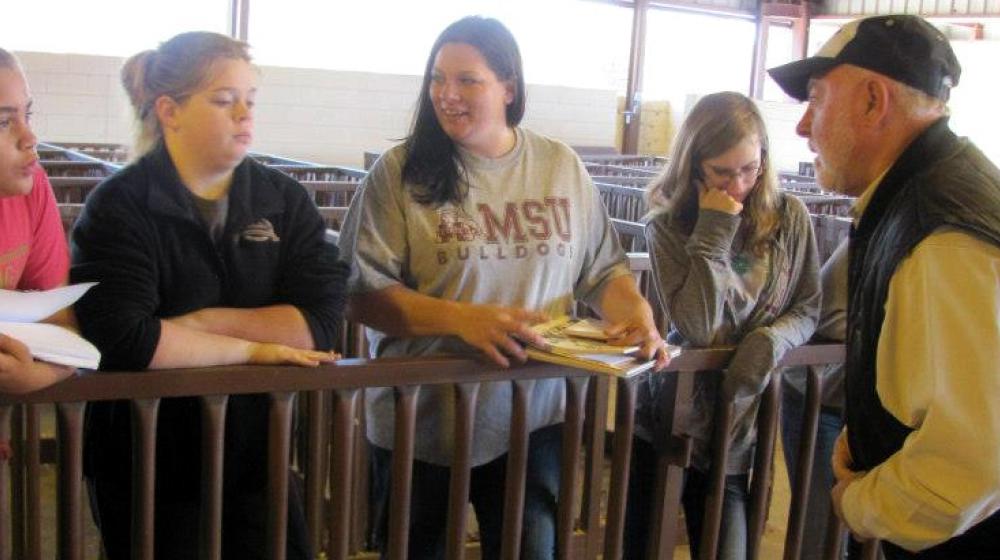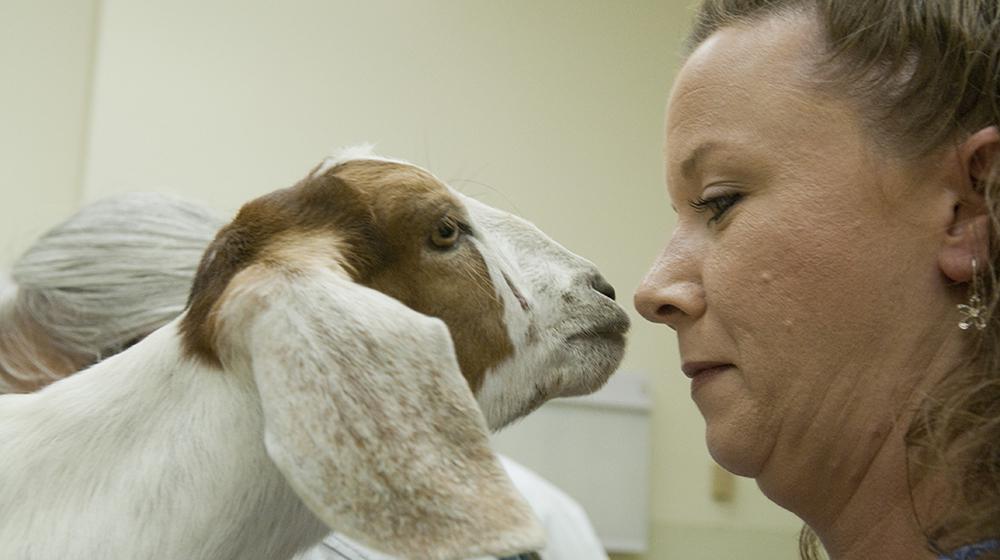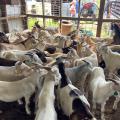Goats and Sheep
Mississippi Small Ruminant Livestock
Small ruminant livestock is a term used to describe goats and sheep. Goat numbers in the state have continued to grow at a steady pace over the years. Most recently sheep numbers are on the rise as well. In the future we could see sheep numbers match or exceed goat numbers in the state due to the popularity of hair sheep.
The addition of Boer breeding stock to the mix of native goats spurred new interest in the meat goat industry. A large number of special sales bringing in outside goats, as well as locally raised goats came into existence with the introduction of the Boer goat. The opening of receiving stations or special goat auctions provided producers with viable outlets for their goat production. Most recently interest in Kiko and Spanish bred goats has increased due to desirable traits such as parasite resistance and hardiness.

The fastest growing segment of the small ruminant industry today is hair sheep production. The addition of Dorper breeding stock and an upsurge in Katahdin and Katahdin cross sheep in the state has spurred an increase in sheep numbers. Native sheep have been crossed successfully to provide a meat type sheep that has high demand at market. Desirable traits such as economical production make the hair sheep a popular choice in our state.
The majority of goats and sheep are sold by the head on a year round basis. However, peak market for sheep and goats range from early to late spring. It appears that the market for sheep and goats has leveled off at prices to indicate a viable industry has been created in the state. More numbers are being sold as commercial rather than registered breeding stock for the first time in the industry. Successful producers have created their own local market and are operating successfully at manageable levels. In Mississippi today, many goats and sheep are sold through various outlets such as auction barns, to specialty market buyers in adjoining states, or to other commercial breeders looking to upgrade their breeding stock.
In addition to the commercial production of goats and sheep, many youth livestock projects in Mississippi focus on goat and sheep production. These producers are small in number compared to commercial producers but are still an integral part of production none the less. There are limited traditional wool sheep producers in the state today with most of these flocks involved in club lamb production. The club lamb and club goat market commands a much higher price than commercial markets and targets the junior livestock program. The quality of club goat and club lamb producers continues to increase, thereby expanding these markets to areas outside the state. Though these are niche markets, both are highly competitive and provide significant economic impact to the overall goat and lamb market.
Small ruminants such as goats and sheep are a popular choice for small farm and limited resource producers. Likewise, other livestock producers see the opportunity to diversify by adding small ruminants to their operation. The future of the meat goat and hair sheep industry in Mississippi is bright.
Mississippi Hay and Commodity Feed Source Directories
A Mississippi Hay Directory is now online available to assist Mississippi horse owners in locating hay supplies. The list provided includes information from individuals and businesses who have submitted a Mississippi Hay Directory Listing Submission Form indicating that they have hay for sale. Listings expire after 60 days. A Mississippi Commodity Feed Source Directory is available online to assist Mississippi livestock producers in locating feed supplies. It is comprised of commodity feed manufacturer, broker, and dealer listings compiled by Mississippi State University Extension Service personnel.
eXtension Goats and Sheep Information
eXtension provides objective and research-based information and learning opportunities that help people improve their lives. It is an educational partnership of 74 universities in the United States.
Publications
News
RAYMOND, Miss. -- Small ruminants are a popular choice for people like J.T. Crownover who want to get into the livestock business but do not want to raise cattle. Crownover attended the Central Mississippi Research and Extension Center’s Producer Advisory Council meeting Feb. 20. The forum, where agricultural producers can discuss their needs with MSU administrators, researchers, specialists and Extension agents, was the catalyst for the university’s active small ruminant program.
LEAKESVILLE, Miss. -- Most goat meat sold in the U.S. is imported, but a group of Mississippi meat goat producers wants to see that change. A first-of-its-kind test in the state is underway to help them meet that goal. The Southeastern Buck Performance Test aims to improve the profitability of the meat goat industry in the region by improving meat goat genetics.
Some people use lamb and sheep interchangeably to identify the animal, but they aren’t exactly the same thing. So, what’s the difference between them? Yes, lambs are baby sheep -- that’s the main distinction. But here are some other differences between the two:
Success Stories
In late February, Mississippi State University hosted the 2024 National Floriculture Forum, an annual conference held at different locations around the country.












